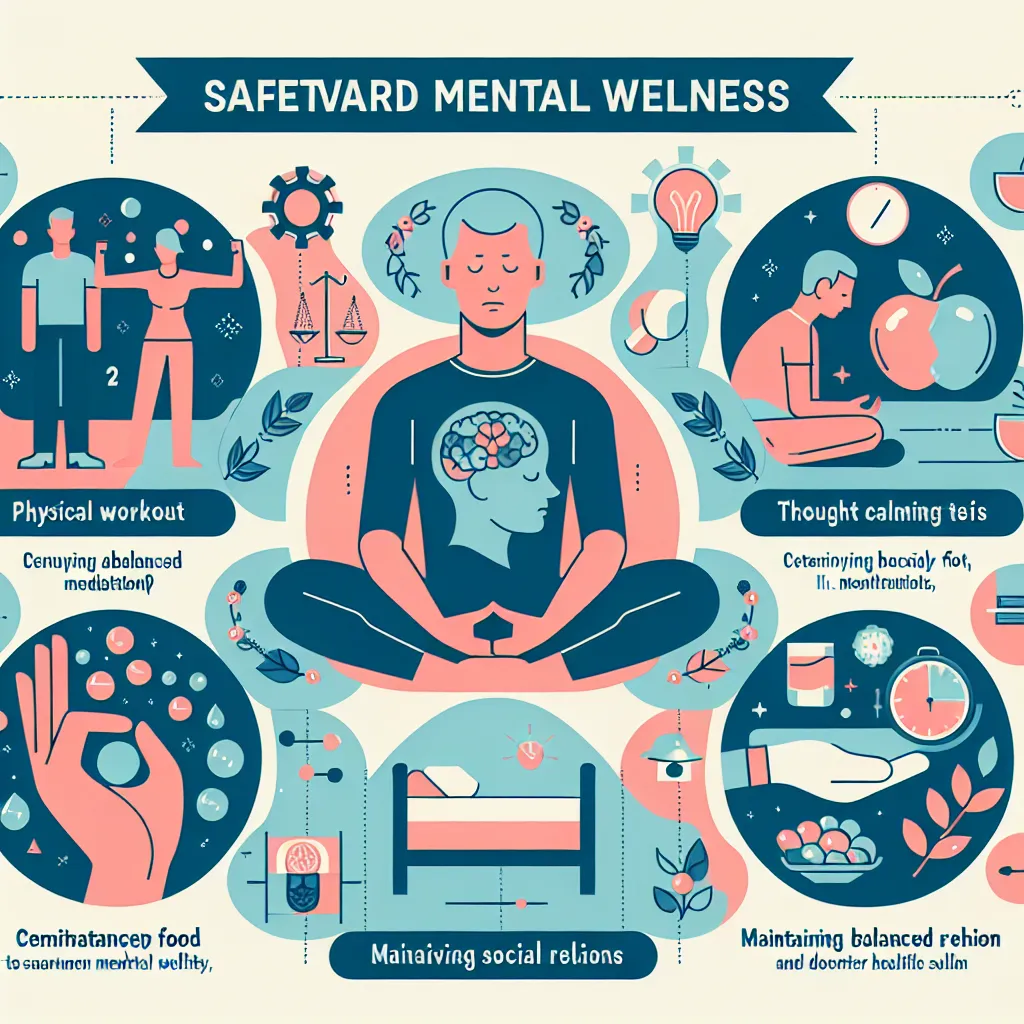The IELTS Reading section is a crucial component of the test, requiring candidates to demonstrate their ability to understand complex texts and answer various question types. Today, we’ll focus on a topic that has gained significant importance in recent years: “Tips for protecting your mental health.” This subject has become increasingly prevalent in IELTS exams, reflecting its relevance in modern society. Given its current significance and the growing awareness of mental health issues worldwide, it’s highly likely that similar topics will continue to appear in future IELTS tests.
Let’s dive into a practice reading passage on this important subject, followed by a series of questions to help you hone your skills for the IELTS Reading section.
 Mental health tips infographic
Mental health tips infographic
Reading Passage
Safeguarding Your Mental Well-being: Essential Strategies for Modern Life
In today’s fast-paced world, maintaining good mental health has become increasingly challenging yet crucial. The constant bombardment of information, societal pressures, and the demands of daily life can take a significant toll on our psychological well-being. However, by implementing certain strategies, individuals can protect and enhance their mental health, leading to a more balanced and fulfilling life.
One of the most effective ways to support mental health is through regular physical exercise. Engaging in physical activities releases endorphins, often referred to as “feel-good” hormones, which can significantly improve mood and reduce stress levels. Even moderate exercise, such as a brisk 30-minute walk five times a week, can have substantial benefits for mental well-being. Moreover, exercise can serve as a form of meditation in motion, allowing individuals to break free from the cycle of negative thoughts that often accompany anxiety and depression.
Equally important is the practice of mindfulness and meditation. These techniques help individuals stay grounded in the present moment, reducing rumination about past events or anxiety about the future. Regular meditation has been shown to physically alter brain structures, increasing gray matter in areas associated with learning, memory, and emotional regulation. Even brief daily sessions of 10-15 minutes can yield noticeable improvements in mental clarity and emotional stability.
Nutrition also plays a vital role in mental health. A balanced diet rich in omega-3 fatty acids, found in fish, nuts, and seeds, can support brain function and potentially alleviate symptoms of depression. Additionally, reducing the intake of processed foods and maintaining stable blood sugar levels can help prevent mood swings and improve overall mental well-being.
Social connections are another cornerstone of good mental health. Humans are inherently social creatures, and maintaining strong relationships with family, friends, and community can provide emotional support, reduce stress, and increase overall life satisfaction. In our digital age, it’s crucial to foster genuine face-to-face interactions alongside online communications to build and maintain these vital social bonds.
Sleep hygiene is often overlooked but is fundamental to mental health. Consistent, quality sleep allows the brain to process emotions, consolidate memories, and recharge. Establishing a regular sleep schedule, creating a relaxing bedtime routine, and limiting screen time before bed can significantly improve sleep quality and, by extension, mental well-being.
Lastly, learning to set boundaries and manage stress effectively is essential. This includes learning to say no to excessive commitments, practicing time management, and engaging in activities that bring joy and relaxation. Developing healthy coping mechanisms, such as journaling, art, or talking to a trusted friend, can also provide outlets for stress and emotional processing.
It’s important to recognize that protecting mental health is an ongoing process that requires consistent effort and self-awareness. While these strategies can be highly effective, it’s also crucial to seek professional help when needed. Mental health professionals can provide tailored strategies and support for individuals facing more significant challenges.
In conclusion, by incorporating these strategies into daily life – regular exercise, mindfulness practices, balanced nutrition, strong social connections, good sleep hygiene, and effective stress management – individuals can build resilience and maintain good mental health in the face of life’s challenges. Remember, taking care of your mental health is not a luxury, but a necessity for a balanced, productive, and fulfilling life.
Questions
True/False/Not Given
Answer True, False, or Not Given to the following statements based on the information provided in the passage.
- Physical exercise is considered the most crucial factor in maintaining good mental health.
- Meditation can physically change the structure of the brain.
- A diet rich in omega-3 fatty acids can potentially help with depression symptoms.
- Online social interactions are more beneficial for mental health than face-to-face interactions.
- Poor sleep quality can negatively impact emotional processing and memory consolidation.
Multiple Choice
Choose the correct letter, A, B, C, or D.
-
According to the passage, which of the following is NOT mentioned as a benefit of regular exercise for mental health?
A) Improved mood
B) Reduced stress levels
C) Increased focus and concentration
D) Release of endorphins -
The passage suggests that mindfulness and meditation:
A) Should be practiced for at least an hour daily
B) Can help reduce focus on past and future concerns
C) Are only effective when combined with exercise
D) Require professional guidance to be beneficial -
Which of the following is described as a strategy for improving sleep hygiene?
A) Increasing screen time before bed
B) Varying sleep schedules regularly
C) Establishing a relaxing bedtime routine
D) Sleeping for longer hours on weekends
Matching Headings
Match the following headings to the appropriate paragraphs in the passage. Write the correct number (i-viii) next to questions 9-13.
i. The Role of Diet in Mental Well-being
ii. The Importance of Professional Help
iii. Exercise as a Mood Enhancer
iv. Balancing Digital and Real-world Connections
v. Mindfulness and Brain Structure
vi. Sleep’s Impact on Emotional Processing
vii. Setting Boundaries for Mental Health
viii. The Ongoing Nature of Mental Health Care
- Paragraph 2 __
- Paragraph 3 __
- Paragraph 4 __
- Paragraph 5 __
- Paragraph 6 __
Short Answer Questions
Answer the following questions using NO MORE THAN THREE WORDS from the passage for each answer.
- What term is used to describe the hormones released during exercise that improve mood?
- How long should a daily meditation session be to yield noticeable improvements in mental clarity?
- What type of foods should be reduced to help prevent mood swings?
- In addition to family and friends, what other social group is mentioned as important for maintaining strong relationships?
- What activity is suggested as a healthy coping mechanism for stress and emotional processing?
Answer Key and Explanations
True/False/Not Given
- False – The passage states it’s “one of the most effective ways,” not the most crucial factor.
- True – The text mentions that regular meditation “has been shown to physically alter brain structures.”
- True – The passage states that a diet rich in omega-3 fatty acids can “potentially alleviate symptoms of depression.”
- Not Given – The passage emphasizes the importance of face-to-face interactions but doesn’t compare their benefits to online interactions.
- True – The text indicates that quality sleep allows the brain to “process emotions, consolidate memories, and recharge.”
Multiple Choice
- C – The passage doesn’t mention increased focus and concentration as a benefit of exercise for mental health.
- B – The text states that these techniques help individuals “stay grounded in the present moment, reducing rumination about past events or anxiety about the future.”
- C – The passage mentions “creating a relaxing bedtime routine” as a strategy for improving sleep hygiene.
Matching Headings
- iii – This paragraph focuses on exercise and its benefits for mental health.
- v – This paragraph discusses how meditation can alter brain structures.
- i – This paragraph is about the role of nutrition in mental health.
- iv – This paragraph discusses the importance of balancing face-to-face and online social interactions.
- vi – This paragraph focuses on the importance of sleep for emotional processing and mental well-being.
Short Answer Questions
- feel-good hormones
- 10-15 minutes
- processed foods
- community
- journaling
Common Mistakes and How to Avoid Them
- Overlooking key phrases: Pay attention to qualifying words like “one of” or “can.” These can change the meaning significantly.
- Making assumptions: Stick to the information given in the text. Don’t bring in outside knowledge or make inferences beyond what’s stated.
- Misinterpreting Not Given: Remember, this option means the information isn’t provided in the text, not that it’s false.
- Rushing through the passage: Take time to understand the main ideas and structure of each paragraph.
- Ignoring context: Consider how each sentence relates to the overall paragraph and passage.
Vocabulary
- Bombardment: (noun) /bɒmˈbɑːd.mənt/ – an attack with many bombs, shells, etc., or a large number of questions, criticisms, etc.
- Endorphins: (noun) /enˈdɔːfɪnz/ – chemicals produced by the body that reduce pain and make you feel happier
- Mindfulness: (noun) /ˈmaɪnd.fəl.nəs/ – the practice of being aware of your body, mind, and feelings in the present moment
- Rumination: (noun) /ˌruːmɪˈneɪʃən/ – the act of thinking carefully and for a long period about something
- Hygiene: (noun) /ˈhaɪ.dʒiːn/ – the practice of keeping yourself and your surroundings clean, especially in order to prevent illness or the spread of diseases
Grammar Focus
Pay attention to the use of present perfect tense in sentences like:
“Regular meditation has been shown to physically alter brain structures.”
This tense is used to describe past actions with present relevance. The structure is:
Subject + has/have + past participle
Example: Scientists have discovered that exercise improves mental health.
Tips for IELTS Reading Success
- Time management is crucial. Allocate your time wisely across all sections of the reading test.
- Skim the passage first to get a general idea, then read questions carefully before searching for specific details.
- Practice identifying different question types and develop strategies for each.
- Improve your vocabulary regularly, focusing on academic and topic-specific words.
- Read a variety of texts on different subjects to broaden your understanding and reading speed.
Remember, consistent practice is key to improving your IELTS Reading score. Utilize resources like our guide on improving listening skills to enhance your overall IELTS performance. Additionally, managing stress during exam preparation is crucial; consider reading our article on tips for achieving financial security to reduce one potential source of stress.
By focusing on these strategies and continuously expanding your knowledge base, you’ll be well-prepared to tackle the IELTS Reading section with confidence.


